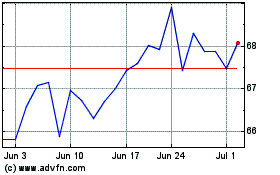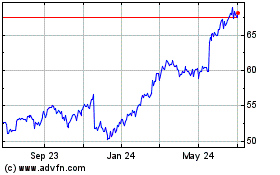By Saabira Chaudhuri and Sarah Nassauer
LONDON -- Two years ago, Gemma Williams switched to Aldi from
Asda for her grocery shopping, and thanks to the GBP200 ($249) she
and her husband estimate they are saving every month, they aren't
going back.
"If we go to Asda we always notice we end up spending almost
double what we would at Aldi," said Ms. Williams, a psychology
student at the University of Lincoln in eastern England.
Wal-Mart Stores Inc., which owns Asda, is looking to woo back
customers like Ms. Williams as it attempts to turn around its
struggling international businesses. The U.K., where Wal-Mart
operates 625 Asda stores, is the Bentonville, Ark., retailer's
biggest overseas market by revenue, and the only one where sales in
stores open at least a year are declining. Sales at Asda haven't
grown in the past 13 consecutive quarters.
Wal-Mart acquired Asda in 1999, and for years it has been one of
the company's most profitable businesses, contributing about 4% to
Wal-Mart's earnings in 2015, according to an estimate from Morgan
Stanley. Wal-Mart doesn't break out Asda sales or profit as a
percentage of business.
But the chain has struggled in England's competitive supermarket
sector, losing share to discount retailers such as Aldi and Lidl
even as other rivals have shored up their customer service and made
price-cutting moves. According to Kantar Worldpanel, Asda's market
share dropped to 15.6% as of late January, compared with 17.1% in
May 2014; during that period, Aldi's share rose to 6.2% from 4.7%,
and Lidl's to 4.5% from 3.6%.
Wal-Mart has been attempting to turn those figures around. Last
summer it replaced Asda's chief executive, Andy Clarke, who had
been with the company for more than 20 years, with Sean Clarke, a
rising star who previously led Wal-Mart's China operations. (The
two are unrelated.)
On Tuesday, Wal-Mart reported that Asda's same-store sales fell
2.9% in its most recent quarter, an improvement from its 5.8%
decline in the previous one.
"In the U.K. we faced some challenges this past year and we're
addressing these with urgency," Doug McMillon, Wal-Mart's chief
executive, said on an earnings call. "I visited stores in the
market a few weeks ago and the team has us pointed in the right
direction."
Mr. Clarke has been given the go-ahead to compete more on price
with discount retailers, according to people familiar with those
plans. Last month, Asda halved prices on popular items such as
Napolina canned tomatoes and Pot Noodle soups.
The move was overdue, says Wal-Mart's chief administrative
officer, Scott Price. "Roughly 18 months ago we saw -- ha! --
pricing is getting more competitive," he said in an interview this
month. "We should have become more aggressive then."
Wal-Mart also plans to ramp up the use of its massive size to
get lower prices from suppliers, Mr. Price said. It wants to stock
Asda shelves with more U.S. products that can't be found elsewhere
in England, such as the Shopkins Shoppies Gemma Stone doll it sold
there last Christmas. It has also recently used its heft to secure
deals on everything from olive oil to refrigeration units for
Asda.
England's supermarket sector, because of the steep competition
and large numbers of online shoppers, is billed by many retail
executives as the world's toughest, a bellwether for challenges
that could eventually hit the U.S. market. Still, analysts and
former Asda executives say many of Wal-Mart's British woes are of
its own making.
"Asda and its Wal-Mart International superiors misjudged the
U.K. market and what the business needed to do to be better
positioned for its customers in the evolving scene," said Shore
Capital analyst Clive Black.
In recent years, U.K. rivals Tesco PLC, J Sainsbury PLC and Wm
Morrison Supermarkets PLC poured money into their operations, but
Wal-Mart held back. It tapped a string of Asda's most senior
executives, including its operations chief, e-commerce head and two
chief financial officers, and put them in positions with its U.S.
business -- weakening Asda's talent pool, say analysts.
Under Mr. Clarke, Asda is working on more quickly identifying
product shortages and putting more staff on shop floors, said Mr.
Price, efforts that he added are showing "green shoots."
Asda nevertheless has an uphill battle to win back some
customers. Amraze Khan, a communications executive based in the
northern England town of Halifax for the past two years, has been
bypassing an Asda store five minutes from his home, instead driving
20 minutes to a Tesco.
"At Asda there wasn't any care at all," Mr. Khan said. "I'd
rather go to Tesco because they're very attentive."
Write to Saabira Chaudhuri at saabira.chaudhuri@wsj.com and
Sarah Nassauer at sarah.nassauer@wsj.com
(END) Dow Jones Newswires
February 25, 2017 09:14 ET (14:14 GMT)
Copyright (c) 2017 Dow Jones & Company, Inc.
Walmart (NYSE:WMT)
Historical Stock Chart
From Dec 2024 to Jan 2025

Walmart (NYSE:WMT)
Historical Stock Chart
From Jan 2024 to Jan 2025
